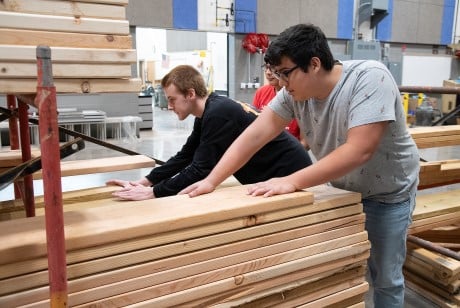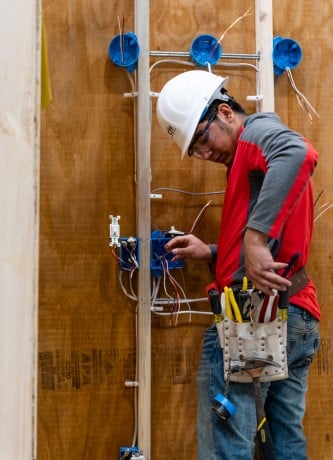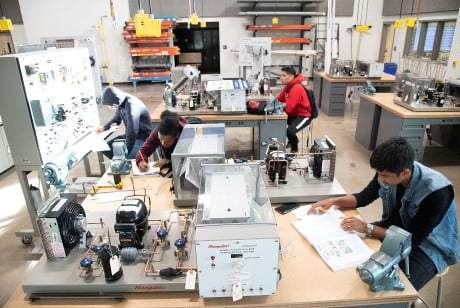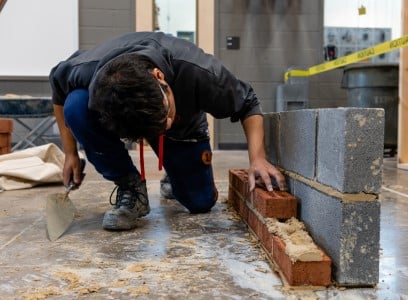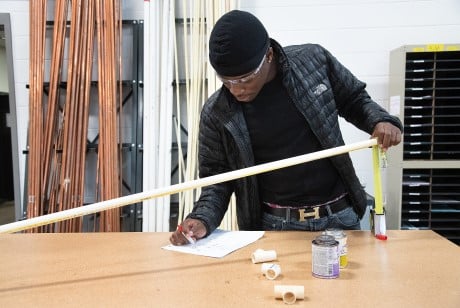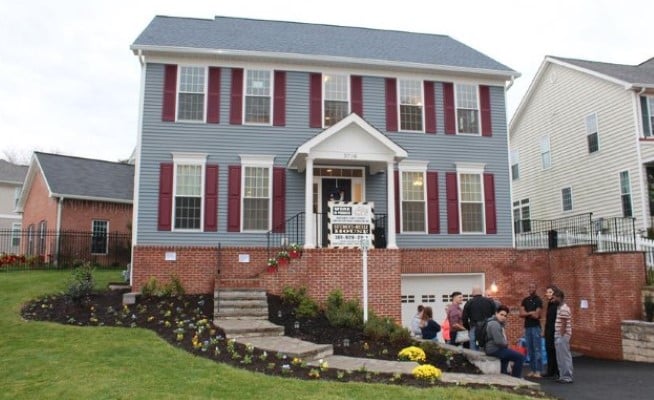
Construction Cluster
- Carpentry - Mr. Wheatley
- Electricity (Construction Electricity) - Mr. Edmands
- Heating, Ventilation, & Air Conditioning (HVAC) - Mr. Ramirez and Mr. Mendez
- Masonry - Mr.Clark
- Plumbing - Mr. Holcomb Jr.
- Principles of Architecture & CAD Technology -Ms. Adelekan and Dr. Phinney
Carpentry students develop competencies in a variety of construction skills including: blueprint reading, layout techniques, floor and wall construction, door installation, stair construction, and cabinet installation.
Students develop skills that provide entry into advanced educational opportunities in college or to begin a career as a carpenter. Instruction is based on the National Center for Construction Education and Research (NCCER) curriculum.
Graduates are prepared to pursue two- or four-year college programs in architecture, engineering, business management, and construction management.
Licenses & Certifications:
- NCCER Carpentry Level 1 & 2 Certification
- OSHA 10 Safety Certification
- Maryland State Erosion and Sediment Control Certification
- Hilti Power Actuated Nailer Certification (age 18 and older)
Program Highlights:
- National Center for Construction Education and Research (NCCER) curriculum.
- Students apply learned theory and skills by working at the student-built house.
- Automatically earn 15 SSL hours per semester with a passing grade in the course.
- Students have the opportunity for dual-enrollment at Montgomery College in the Construction Management Program.
- Articulated credit for Edison Coursework
Montgomery College Articulations:
For all articulations, the student must earn an “A” or “B” every semester to be eligible for credit. Some articulations have additional requirements.
Edison Semesters Montgomery College Courses Articulated
4 semesters BLDG 140 Fundamentals of Carpentry (4 credits)
Montgomery College Articulation Agreement can be accessed HERE.
Electricity (Construction Electricity)
Construction Electricity students develop skills in electrical hand tool safety and use; blueprint reading and interpretation; electrical system and design; conductor selection and sizing; electrical wiring system design; and voltage/amperage calculations. All instruction is based on the National Electrical Code and is based on the National Center for Construction Education and Research (NCCER) curriculum.
Graduates of the program are prepared and encouraged to continue their education in college/university programs, such as electrical engineering, electronics technology, and construction technology. Aspiring electricians participate in a four to five-year apprenticeship, and a minimum of 144 hours of classroom instruction each year.
Licenses & Certifications:
- NCCER Electricity Level 1 & 2 Certification
- OSHA 10 Safety Certification
- Montgomery County Maryland Electrical Apprentice licenses
Program Highlights:
- National Center for Construction Education and Research(NCCER) curriculum.
- Instruction based on National Electrical Code.
- Students apply learned theory and skills by working at the student-built house.
- Earn hours towards electrical apprenticeship.
- Automatically earn 15 SSL hours per semester with a passing grade in the course.
- Students have the opportunity for dual-enrollment at Montgomery College in the Construction Management Program.
- Opportunity to earn college credit while still in high school (see below).
Montgomery College Articulations:
For all articulations, the student must earn an “A” or “B” each and every semester to be eligible for credit. Some articulations have additional requirements.
Edison Semesters Montgomery College Courses Articulated
4 semesters BLDG 130 Intro. to the Building Trades (3 credits)*
(1 FBCT + 3 Electricity)* BLDG 150 Fundamentals of Electrical Wiring (4 credits)
*NOTE: Student must complete with an “A” or “B” Edison’s Foundations of Building and Construction course for BLDG 130 credit.
Additional Information:
Heating, Ventilation, & Air Conditioning (HVAC)
HVAC prepares students for the challenges and demands of one of the fastest growing and most highly-technical of all construction related industries. Using classroom, lab, and job site experiences, rigorous education and training is provided in basic and advanced HVAC principles including the mathematical, environmental, and theoretical components of heating and refrigeration. Instruction includes sheet metal layout, fabrication, and installation; tubing and piping processes; equipment installation, testing and maintenance; system analysis and troubleshooting (including HVAC computer programs); heat theory, furnaces, boilers and heat pumps; refrigerant recovery operations; and HVAC control systems. Instruction is based on the National Center for Construction Education and Research (NCCER) curriculum.
Students are prepared to take the Air Conditioning and Refrigeration Institute (ARI) competency exam or to pursue post-secondary education and/or advanced training.
Licenses & Certifications:
- NCCER HVAC Level 1 & 2 Certification
- OSHA 10 Safety Certification
- Cloro-fluorocarbon (CFC) Type one Certification
- Multi-Meter Certification
Program Highlights:
- National Center for Construction Education and Research (NCCER) curriculum.
- Students apply learned theory and skills by working at the student-built house.
- Automatically earn 15 SSL hours per semester with a passing grade in the course.
- Students have the opportunity for dual-enrollment at Montgomery College in the Construction Management Program.
- Opportunity to earn college credit while still in high school (see below).
Montgomery College Articulations:
For all articulations, the student must earn an “A” or “B” each and every semester to be eligible for credit. Some articulations have additional requirements.
Edison Semesters Montgomery College Courses Articulated
4 semesters* BLDG 130 Intro. to the Building Trades (3 credits)*
(1 FBCT + 3 HVAC)*
*NOTE: Student must complete with an “A” or “B” Edison’s Foundations of Building and Construction course for BLDG 130 credit.
Masonry
Masonry students learn the proper techniques for laying brick and block in a variety of patterns and configurations. Integrated into the program are applied mathematical principles that are used in material estimation, weight and load calculations, and volume and proportioning of various materials used in the masonry industry. Students learn how to use computers to generate material and cost estimates. Students apply learned theory and skills by completing all the brickwork for the student-built house. Instruction is based on the National Center for Construction Education and Research (NCCER) curriculum.
Graduates are prepared to pursue two- or four-year college programs in construction or business management.
Licenses & Certifications:
- NCCER Masonry Level 1 & 2 Certification
- OSHA 10 Safety Certification
- Maryland State Erosion and Sediment Control Certification
Program Highlights:
- National Center for Construction Education and Research (NCCER) curriculum.
- Students apply learned theory and skills by working at the student-built house.
- Automatically earn 15 SSL hours per semester with a passing grade in the course.
- Students have the opportunity for dual-enrollment at Montgomery College in the Construction Management Program.
- Opportunity to earn college credit while still in high school (see below).
Montgomery College Articulations:
For all articulations, the student must earn an “A” or “B” each and every semester to be eligible for credit. Some articulations have additional requirements.
Edison Semesters Montgomery College Courses Articulated
4 semesters* BLDG 130 Intro. to the Building Trades (3 credits)*
(1 FBCT + 3 Masonry)*
*NOTE: Student must complete with an “A” or “B” Edison’s Foundations of Building and Construction course for BLDG 130 credit.
Plumbing
Plumbing students learn the theoretical and practical application and installation of plumbing and gas systems, as well as plumbing codes. Students apply that knowledge by completing the installation of gas, drain, waste, vent, water systems, as well as the installation of fixtures, appliances, and appurtenances in the student-built house. Instruction is based on the National Center for Construction Education and Research (NCCER) curriculum. Students who successfully complete the program are provided two years of the education requirements towards Maryland State licensure as a Journeyman Plumber/Gasfitter.
Two outstanding graduates are accepted directly into a local plumbing union, guaranteeing post-secondary education and employment.
Licenses & Certifications:
- NCCER Plumbing Level 1 & 2 Certification
- OSHA 10 Safety Certification
- Maryland State Plumbing/Gasfitting Apprentice License
Program Highlights:
- National Center for Construction Education and Research (NCCER) curriculum.
- Students apply learned theory and skills by working at the student-built house.
- Automatically earn 15 SSL hours per semester with a passing grade in the course
- Students have the opportunity for dual-enrollment at Montgomery College in the Construction Management Program.
- Opportunity to earn articulated college credit
- Resources to pursue Maryland State Plumber and Gasfitter Apprentice License
Montgomery College Articulations:
For all articulations, the student must earn an “A” or “B” each and every semester to be eligible for credit. Some articulations have additional requirements.
Edison Semesters Montgomery College Courses Articulated
4 semesters BLDG 160 Fundamentals of Plumbing (4 credits)
Montgomery College Articulation Agreement can be accessed HERE.
Principles of Architecture & CAD Technology
Principles of Architecture & CAD students combine collaboration, creativity, and learning through applying the fundamentals of architecture and technical drawing to complete original designs. This challenging college-preparatory program combines four essential categories of student performance: Critical Thinking and Representation, Building Practices and Technical Skills, Architectural Solutions, and Professional Practices. Students also apply visual communication skills of sketching; technical drawing; physical and virtual modeling, utilizing the design process from original concept to complete architectural drawings using Auto CAD and Revit programs.
Second-year students participate in the Young American House Design competition, where they work with a team of local architects to design a complete house. The student house design that is selected, is the house that is built by the Construction students. Upon successful completion of the program, students are prepared to further their education at the college/university level and pursue careers in the industry, such as building design, site development and planning, interior design, construction management, and architecture.
Licenses & Certifications:
- Autodesk AutoCAD
- OSHA 10 Safety Certification
Program Highlights:
- Students have the opportunity to work with local architects
- Automatically earn 15 SSL hours with a passing grade in the first semester of their second year at Edison.
- Students have the opportunity for dual-enrollment at Montgomery College in the Construction Management Program.
- Opportunity to earn college credit while still in high school (see below).
Montgomery College Articulations:
For all articulations, the student must earn an “A” or “B” each and every semester to be eligible for credit. Some articulations have additional requirements.
Edison Semesters Montgomery College Courses Articulated
4 semesters ARCH 103 Building Tech & Documentation (3 credits)*
ARCH 183 CAD: Architectural Applications (4 credits)*
*NOTE: Students must also pass MC departmental exam for ARCH 103 and ARCH 183 credit.Additional Information:

